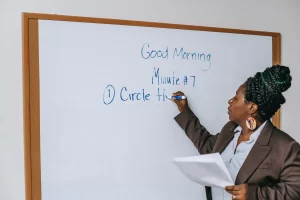Introduction
Effective communication is a critical skill for success in both personal and professional relationships. It is the process of exchanging information and ideas in a way that is clear, concise, and easily understood. When communication is effective, both parties are able to express their thoughts and feelings in a way that is respectful and constructive. Effective communication involves both verbal and nonverbal communication and requires active listening and understanding. In this blog post, we’ll explore the ins and outs of effective communication and provide you with tips and tricks for becoming a more skilled communicator.
Verbal Communication
Verbal communication is the most common form of communication, and it’s important to be able to express yourself clearly and concisely. When communicating verbally, it’s important to use simple language and avoid technical jargon or terms that the other person may not understand. Additionally, active listening is key to better understanding the other person’s point of view. To listen actively, focus on the speaker, ask questions, and avoid interrupting or making assumptions. By practicing these skills, you can become a more effective verbal communicator and build stronger relationships with those around you.
Nonverbal Communication
Nonverbal communication is just as important as verbal communication, and it can often convey more meaning than words alone. When communicating nonverbally, it’s important to pay attention to the other person’s body language, facial expressions, and other nonverbal cues. This can help you better understand the other person’s emotions and reactions, and adjust your communication style accordingly. In addition, being aware of your own nonverbal cues can help you communicate more effectively and build stronger connections with those around you. By practicing these skills, you can become a more skilled and perceptive communicator.
Empathy
Empathy is the ability to understand and share the feelings of another person, and it’s a critical component of effective presenting. By showing empathy, you can build trust and establish a deeper connection with the other person. To show empathy, try to put yourself in the other person’s shoes and reflect on their feelings. For example, you might say, “I can understand why you’re feeling frustrated about this situation.” This can help the other person feel heard and understood and can open up the lines of communication for a more productive conversation. By practicing empathy, you can become a more skilled and compassionate communicator.
Feedback
Feedback is a critical part of effective communication, as it allows both parties to provide input and make improvements. When providing feedback, it’s important to do so in a constructive and respectful manner. Start by highlighting what the other person did well, and then provide suggestions for improvement. For example, you might say, “I really appreciate your hard work on this project, but I think we could make it even better by including more specific examples.” Additionally, be open to receiving feedback from others and take their suggestions into consideration. By embracing feedback, you can become a more skilled and self-aware communicator.
Conclusion
Effective communication is a critical skill that can help you succeed in all areas of your life. By focusing on both verbal and nonverbal communication, practicing empathy, and embracing feedback, you can become a more skilled and effective communicator. Remember to be patient with yourself and others, and don’t be afraid to make mistakes – effective presenting is a lifelong journey, and there is always room for improvement. By using the tips and tricks presented in this blog post, you can start building stronger relationships and communicating more effectively today.



This article is so full of fluff. I’m sure these tips work great in theory but in real life, it’s not that simple.
This article is so basic it’s almost insulting. I’m sure everyone already knows these tips.
I disagree with the author’s point about using humor. Humor can be subjective and what one person finds funny another might find offensive.
The article mentions the importance of body language. It’s true that nonverbal cues can speak volumes, but they can also be misinterpreted. Be careful!
This article is a good starting point, but I think it’s important to remember that communication is a complex process. There’s no magic formula for success.
This is really helpful! I’ve been trying to improve my communication skills and this article gave me some great tips. I’m going to try using these techniques in my next meeting.
The article mentions the importance of being clear and concise. It’s ironic that the author seems to have forgotten that rule themselves!
I’ve been struggling with communicating effectively with my colleagues, and this article has given me some great ideas to try. Hopefully, it will help me build stronger relationships.
It’s important to remember that effective communication is a two-way street. You need to be able to listen and understand the other person’s perspective as well.
I’m still waiting for the part of the article where they explain how to communicate with people who just don’t listen. 🤔
I’m not sure about this article. I feel like it’s too basic and doesn’t offer anything new. I’ve read similar advice before.
I laughed out loud when I read the tip about using emojis! It’s like the author thinks that’s all it takes to have a meaningful conversation.
I think the author’s focus on active listening is spot on. So many people are too busy talking that they don’t even hear what the other person is saying.
So, you’re telling me that all I need to do to communicate effectively is to be clear, concise, and confident? Sounds easy enough. 🙄